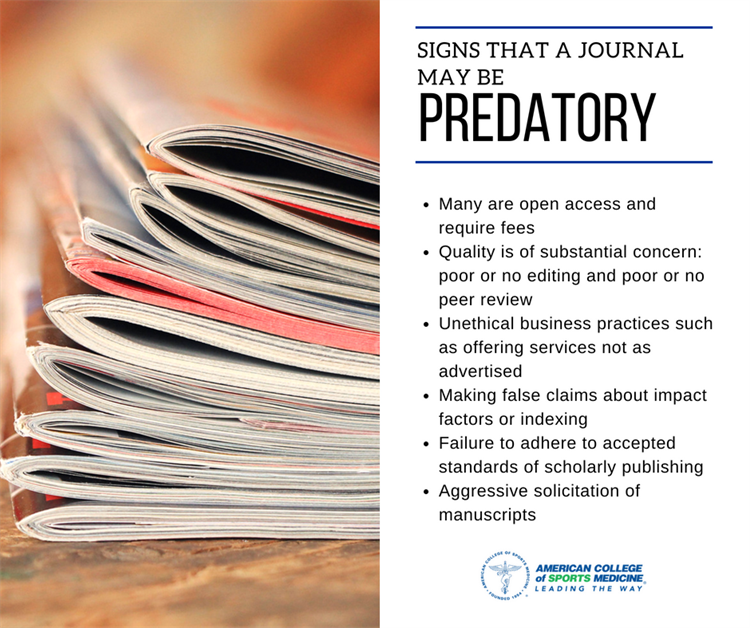L. Bruce Gladden, FACSM, and Jeffrey A. Potteiger, FACSM |
Aug.
16, 2018
Publishing original research is critical to academic and professional achievement. When selecting the journal to which you will submit your work, it is important to consider the options very carefully. While there are many academic journals, 30,000 or more in fact based on some reports, it is estimated that around 10,000 journals employ “predatory publishing” practices and should be avoided at all costs.
What is a predatory journal?
Predatory journals exploit the need for academics and researchers to publish their work, and they use questionable business tactics such as charging the author to publish and then not providing the professional services of a reputable academic journal. The checklist below includes a list of signs that a journal may be predatory.

Why should you avoid publishing in a predatory journal?
There are a number of possible consequences to publishing in a predatory journal. These include:
- Published work is not protected
- Work will receive poor or no peer review
- Work could disappear, or you could lose access if the journal is dissolved
- It may be difficult for others to find your work, and when/if it is found, academics may be reluctant to cite it
- There are documented cases in which publishing in a predatory journal, though inadvertently, resulted in ethics accusations and career injury
- Once work is published in a predatory journal, it can be very difficult, if not impossible, to have that work removed and published elsewhere in a reputable academic journal
How can you avoid predatory journals?
Start by visiting the website Think. Check. Submit. This site provides a checklist and FAQs that can help to guide you through the process of evaluating a journal before submission.
If you have any doubts about a journal’s reputability, consult with a librarian. Librarians are trained to know the publishing process, and those employed by universities work with a wide variety of academic journals daily. Also consult with your colleagues, an advisor, faculty member or mentor. Their experiences can help guide your way.
Other helpful resources:
Watch the ACSM Webinar "Navigating the World of Predatory Publishing," presented by the authors of this blog and moderated by ACSM's Chief Content Officer, Katie Feltman.
L. Bruce Gladden, Ph.D., FACSM, is a professor at Auburn University’s School of Kinesiology. His work is focused on the role of lactate in skeletal muscle and whole-body metabolism. He is the author or co-author of more than 75 refereed research articles and reviews, and his investigative work has attracted research funding from the National Institutes of Health, National Science Foundation, NATO and private research foundations. Dr. Gladden has served as president of the southeast chapter of ACSM, a member of the ACSM Board of Trustees and he is currently the editor-in-chief of Medicine & Science in Sports & Exercise®. He was the recipient of an ACSM Citation Award in 2015 in recognition of his significant contributions to sports medicine and the exercise sciences.
Jeffrey A. Potteiger, PhD, FACSM, is dean of the graduate school at Grand Valley State University (GVSU) and professor in the Department of Movement Science. He received his Ph.D. from Auburn University, his M.S. degree from McDaniel College, and his B.S. degree from Indiana University of Pennsylvania. He has more than 100 published research articles, books, and book chapters much of which have involved work with students. Dr. Potteiger recently published the 3rd edition of the textbook titled ACSM’s Introduction to Exercise Science. Dr. Potteiger serves as the GVSU authorizing institutional official for all research activities and as the university’s research integrity officer. Dr. Potteiger serves on the editorial boards of several journals and as the chair of the ACSM’s Publications Committee. His broad research interest is in how physical activity and nutrition influence health and disease. Much of Dr. Potteiger’s recent research activity has been focused on the role of exercise and dietary intake on the use of carbohydrates and fats by the body.